Father Stu
 for language throughout.
for language throughout.
Reviewed by: Jim O'Neill
CONTRIBUTOR
| Moral Rating: | Very Offensive |
| Moviemaking Quality: |
|
| Primary Audience: | Adults |
| Genre: | Drama |
| Length: | 2 hr. 4 min. |
| Year of Release: | 2022 |
| USA Release: |
April 13, 2022 (wide release) DVD: June 14, 2022 |
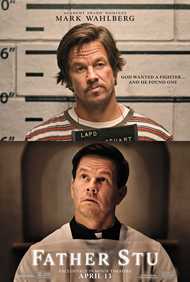

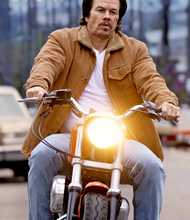


About the life of Stuart Long, a boxer turned Roman Catholic priest
Death of 6 year old boy and the tragic ramifications for his father, mother and brother
About heavy drinking and DRUNKENNESS
Consequences of drunk driving
Man struck down by a degenerative muscle disease
Why does God allow people to suffer?
ORIGIN OF BAD THINGS —Why are they in our world if a good God created us?

Why is the world the way it is? If God is all-knowing, all-powerful, and loving, would He really create a world like this? (filled with oppression, suffering, death and cruelty) Answer
What is SIN AND WICKEDNESS? Is it just “bad people” that are sinners, or are You a sinner?

Discover the good news that Jesus Christ offers
Are you good enough to get to Heaven?
How good is good enough to receive entrance to Heaven?
Are you good enough to get to Heaven?
UNIVERSALISM—Is everyone going to Heaven? Will all people eventually be saved?
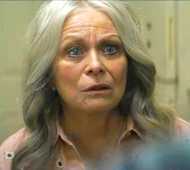

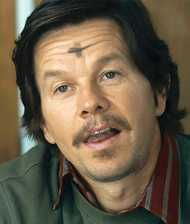
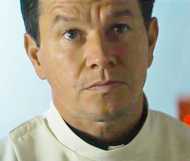
| Featuring |
|---|
|
Mark Wahlberg … Stuart Long Mel Gibson … Bill Long Jacki Weaver … Kathleen Long Winter Ave Zoli … Allison Annet Mahendru … Faith Jefferies … Time Keeper Teresa Ruiz … Carmen Cody Fern … Priest Ned Bellamy … Dr. Novack See all » |
| Director |
|
Rosalind Ross |
| Producer |
|
Palm Drive Productions Jordon Foss Stephen Levinson Mark Wahlberg |
| Distributor |
Roman Catholic priests are one of the most problematic religious figures for Hollywood to confront. They have not been a force of good in movies for some time. In the 1940s and 1950s they were portrayed gallantly by Karl Malden in “On the Waterfront,” Montgomery Clift in “I Confess,” and especially Aldo Fabbrizi in Rossellini’s “Open City.” One of my favorite directors, Robert Bresson, adapted Georges Bernanos’ novel, “Diary of a Country Priest” in 1951, and I consider it the best of all films that have a priest as a central character. Although Bresson makes no judgments about human behavior, he emphasizes the roles of prayer, sacrifice, and especially silence in the quest for salvation. The film’s final words: “What does it matter; all is grace” make for one of the most serene moments in cinematic history.
“Father Stu” may have moments of high comedy and calm humanity, but it is anything but serene. Or graceful.
Stuart Long (played by Mark Wahlberg with his usual terrier-like tenacity) is a former boxer, and drinker, who has reached the end of a once accomplished but now middling career in the ring. In a quixotic quest to become an actor, he leaves his hometown of Big Sky, Montana and moves to Los Angeles. As he waits for the big break he is sure will come his way, he takes a job at a grocery store.
His show-biz networking skills are mostly confined to asking coworkers and customers at the meat counter where he works if they know anyone in the movie business. Selling beef and lamb, but not fish (there’s a good joke thrown in there, but not one about being a “fisher of men”), he meets a customer, Carmen (Teresa Ruiz), a devout young woman (“as Catholic as the Cross”), whom Stu falls for and earnestly pursues.
She is resistant at first but warms to him as he devotes himself doggedly to doing whatever pleases her: cooking dinner for her parents, joining her grade-school children’s “Introduction to Catholicism” class, and consenting to being baptized.
His persistence meets a roadblock whenever he drinks. And when he drinks, he drives. He has two near death accidents, the second of which is almost fatal. Before he loses consciousness, or perhaps during his coma, he has a “vision” of the Virgin Mary, who promises him that he will not die. When he ultimately recovers, he remembers the vision and interprets it as a calling: Mary has chosen me so I, in turn, must choose her Son.
To everyone’s surprise, and to Carmen’s regret at coming in second place to God, Stu decides to forego marriage and become a Catholic priest. Even more dismayed by the news are his atheist parents. His father, Bill (Mel Gibson), an alcoholic forklift driver, who never got over the death of his second son, and his mother, Kathleen (Jacki Weaver), resigned to a life that has passed her and her son by, cannot connect with Stuart’s choice. His mother thinks Stu merely wants to dress up as a priest for Halloween; his father berates him and softens his jabs with one consolation: “I’ve always loved you for the piece of s*** you are.”
While Weaver is wide-eyed and perpetually perplexed, Gibson is a slow-burning cauldron of seething contempt and untampered gall. If he was younger, he would be a walking mean-tweet. As an aging father who lives in a trailer park and drinks cheap whiskey while clinging to an old photo of himself and his two sons, he gives an iconoclastic performance of a sinned against and sinning man. It is also a great one.
Stu’s attempt to enter the priesthood proves to be an even bigger hurdle when the condescending seminary rector (Malcolm McDowell) at first rejects his application. Stu eventually gains admission by sending the rector a cash payment and a handwritten IOU.
Despite some hurdles about doctrine and discipline, he forges a path and becomes a presence in the school. His unorthodox approach to theology has a way of bringing Heaven down to Earth rather than elevating Earth and its pitfalls to a sphere we have been told about through Scripture but have not directly experienced. He is onto something when he states that we are not physical beings with a spiritual component, but “spiritual beings who are going through a bodily experience.”
While in the seminary, Stu develops a rare disease called “inclusion body myositis” which weakens the voluntary muscles to a point that makes them unusable. His ordination and his life are now at risk. He nonetheless pushes on, and so do those around him, as the film transforms itself into a story of forgiveness, redemption and salvation. As the characters convert, so does the film. It is during those final segments when the film may save itself, in the minds of some. The first part of the story, as engaging as it is, struggles as much as its main character to find a foothold. Much like Stu on a bender, it sometimes skids off the main road, but when it gets back on track, it does more than just move forward. It rises, and it often soars.
Much of the film’s success is due to Wahlberg’s appealing persona. His ruddy complexion and pleading brown eyes made me root for him even when the script was murky or maudlin. Sometimes the dialog descends into bad TV-drama babble, especially in some of the bar scenes, one of which implies an encounter with Jesus. There are some bad-taste exchanges, to put it mildly, between Stu and the Christ-like figure, portrayed as a kind of New-Age magician, about male organ size and the many reasons that life gives us to be angry. Stu, frustrated with the figure, threatens to “f*** him up.” There is no doubt about the intended identity of the stranger when he responds to Stu’s threat by saying: “Someone beat you to it.”
The courting dialog between Stu and Carmen is no less mawkish, but Wahlberg and Ruiz carry it off well enough to get the laughs and to raise the needle on the charm meter. Corny dialog may not be a part of everyday life, and in the lips of the wrong actors, can be cringe-worthy, but it can prove magical in movies when delivered with style and gusto. It’s hard not roll your eyes, but also rub your hands in glee, when listening to dopey but memorable exchanges in such classic movies as 1955’s “Female on the Beach” when Jeff Chandler asks Joan Crawford “How do you like your coffee?” and she says “Alone,” or 1950’s “Gun Crazy” when John Dall tells his psychopathic partner in crime and love, Peggy Cummins, that “we go together like guns and ammunition,” or 1981’s “Body Heat” when Kathleen Turner tells William Hurt: “You’re not very smart. I like that in a man.” The banter between Carmen and Stu is no less memorable; it whips up a froth without slumping into a curdle.
First time director and screenwriter Rosalind Ross has conceived what is a personal and heart-felt tribute to a man who devotes himself to a cause and to a title, not just one to be defended in the boxing ring, but inside the ropes of everyday life. He suffers many knockdowns, most of them self-inflicted, but he gets up again and again, and he continues to fight what the Apostle Paul calls “the good fight.”
Ross’ story is not just a Christian one, but an American one. And a masculine one. Since the 1960s the Catholic Church has suffered a crisis of feminization in its ranks, especially in its priesthood. The results have been ruinous. Nuns who have become social justice advocates instead of teachers of souls. Priests have taken over the Church’s feminine roles as well as a feminist approach to teaching which has caused several Catholic seminaries to be referred to as “Pink Palaces.” We all know where these trends have led. It is a breath of fresh air to see the seminarians in Ross’ film playing basketball and playing it roughly. Developing paternal masculinity is as important to priestly formation as mastering religious dogma. Another scene, one that takes place in a prison, highlights this theme when Wahlberg addresses the inmates in a way that shows he can relate to them, on a man to man, damaged goods to damaged goods level. He gains their attention, and perhaps their trust, by acknowledging who they are before instructing them about who they can be.
Oscar Wilde said that “every saint has a past, and every sinner has a future.” The story adopts Wilde’s light but sincere wit, but it too often clings to the Billy Joel ethos that, in life, “sinners are much more fun.”
I understand that vulgarity has a place in a boxing ring or a beer hall. “Raging Bull” and “Leaving Las Vegas” would be silent films without the curse words. Nonetheless, the definitely “f” word feels off-putting when spoken in a pulpit, and especially in a confessional. Sure, comedy is a balancing act between things that go well and things that go poof in an unbalanced world. It is the unexpected that catches us off guard, and makes us laugh, but in “Father Stu” the comic surprises rely too often on bad language, and even bathroom humor, which feels under the belt and over the top. Evidently the real Father Stuart Long earned a degree in English Literature. With that background, one would think his vocabulary would consist of words that had more than four letters in them.
My other complaint is with the eroticization of the baptismal scene which dwells too much on Father Stu’s shirtless torso and the female churchgoers’ reaction. Their wide-eyed faces look like they were spliced from a “Magic Mike” audience scene. It looks cheesy and is reminiscent of the lingering shots of naked male bodies in the movies Andy Warhol and Ken Russell made in the 1960s. Worse than that, it brakes the story’s tempo, one that for the most part keeps the carnal at a simmer and the transcendent aflame.
“Father Stu” emphasizes the point that redemption, salvation, and putting one foot in front of the other every hour of every day depends on us developing a personal relationship with God. Yes, Stu is headstrong and unpredictable. He is easily offended. He bets by taking long shots on his own life. Those are characteristics that the Old Testament writers used to describe the God they loved and knew loved them. Those traits define a human and relatable personality which one could bond with and have a close relationship with. Father Stu understands that. He is a betting man and believes in Someone who once seemingly bet on Job’s life.
In the film, Father Stu beats the odds and scores favor with God. Rosalind Ross, Mark Wahlberg, and a commendable supporting cast—with similar odds stacked against them—have made a movie that respects its central figure and its message of being transformed by Jesus Christ, without being strident or lofty. It slips up repeatedly, but generally sustains a moral core and a tragic-comic rhythm. It attempts to combine devotion to craft with devotion to faith in a way that speaks to what is real in the world we now live in, and in the world we hope to someday call our true home.
- Alcohol: Very Heavy
- Vulgar/Crude language: Very Heavy • F-words (35+) • S-words (34) • “D*ck” (8) • “Pr*ck” • “B*lls” • “You be his b*tch” • “Slut” • “A**” and “A**hole” • “Cr*p” • “P*ss” • “Son of a b*tch” • “N*gger”
- Profane language: Heavy to Very Heavy— • “J*sus” (2) • “G*d d*mn” (5) • “Oh G*d” • “G*d” • “D*mn” • “H*ll”
- Sex: Moderately Heavy— • Mainly in the form of various vulgar sexual dialog and innuendos • Aroused woman astride a man, kissing passionately, which leads to off-screen sex • Strong intimation that a casting agent wants oral pleasuring from man in exchange for an acting role • Mention of a boy’s dad who watches porn • Mother asks adult son if he is going to do a “porno” • Doctor mentions to diseased man eventual loss of erectile function
- Nudity: Moderate— • Cleavage (repeatedly) • Man in underbriefs • Shirtless man (repeatedly)
- Violence: Moderate (sometimes bloody)
- Occult: None
Q & A
Are you good enough to get to Heaven? Answer
How good is good enough? Answer

Why is the world the way it is? If God is all-knowing, all-powerful, and loving, would He really create a world like this? (filled with oppression, suffering, death and cruelty) Answer
What is a TRUE BIBLICAL CHRISTIAN?
What issues often separate Roman Catholics from God? Answer
See list of Relevant Issues—questions-and-answers.


- Positive
- Young people
Moral rating: Excellent! / Moviemaking quality: 5
Moral rating: Very Offensive / Moviemaking quality: 2
Moral rating: Extremely Offensive / Moviemaking quality: no opinion
I will admit – I am a person of faith – yet any person would appreciate the movie’s balanced take on Stuart Long’s life. Rather than presenting the perfect, pious, saintly archetype, audiences see the bad, the good, and the ugly that takes place on the protagonist’s road to conversion. While some viewers might find the main character’s swearing off-putting, I believe it helps portray the human condition. More specifically, it shows how grace can change even the seemingly worst people.See all »
Moral rating: Better than Average / Moviemaking quality: 5
PLEASE share your observations and insights to be posted here.
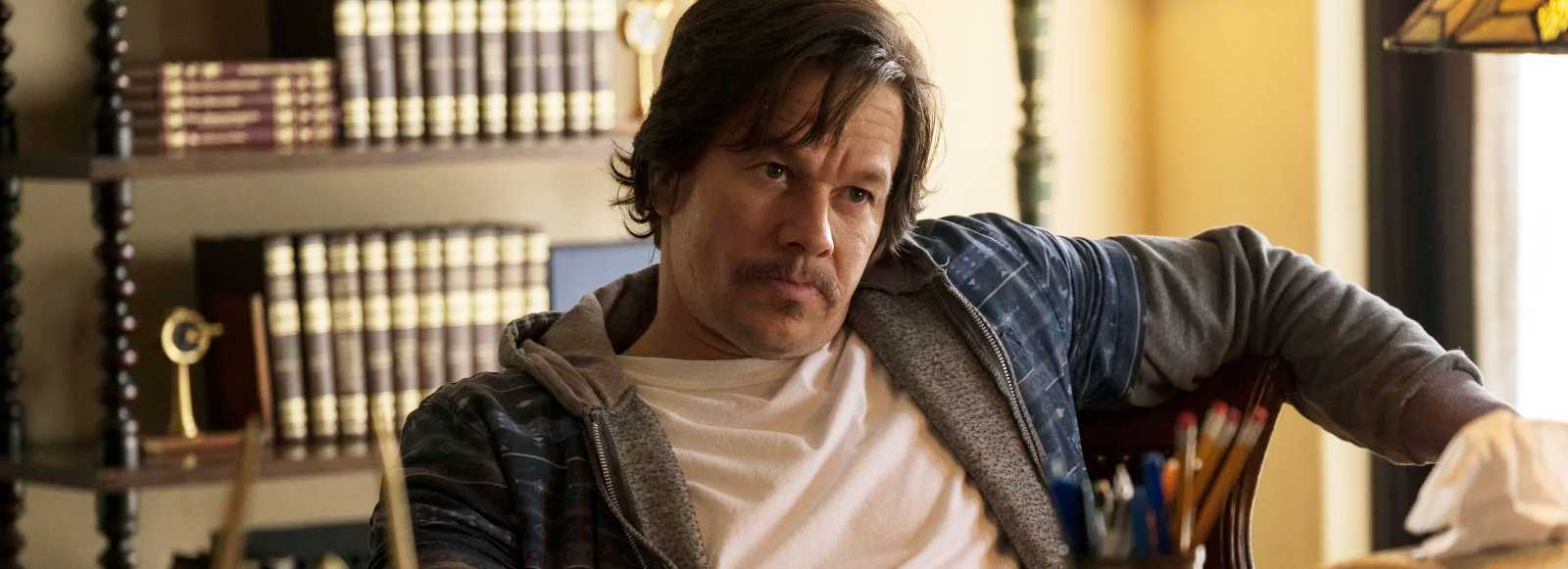



I don’t care for many Christian movies. They’re low budget, preachy, and unrealistic. Many show atheists as villains, like “God’s Not Dead.” I think Father Stu is one of the best Christian movies because it’s a well made movie that doesn’t preach but tells a good story.
I suppose it could of had less language, but remember Stu wasn’t always a Christian—and converting to Catholicism changed his personality. We need less Christian movies like “God’s Not Dead” or “Unplanned” and more like “Father Stu”!
Fun Fact: Mark Wahlberg, who plays Stu, is a devout Catholic who goes to church every day to pray to be a better husband, father, and man.
My Ratings: Moral rating: Offensive / Moviemaking quality: 5